Can Collagen Supplements Really Help Endurance Athletes?
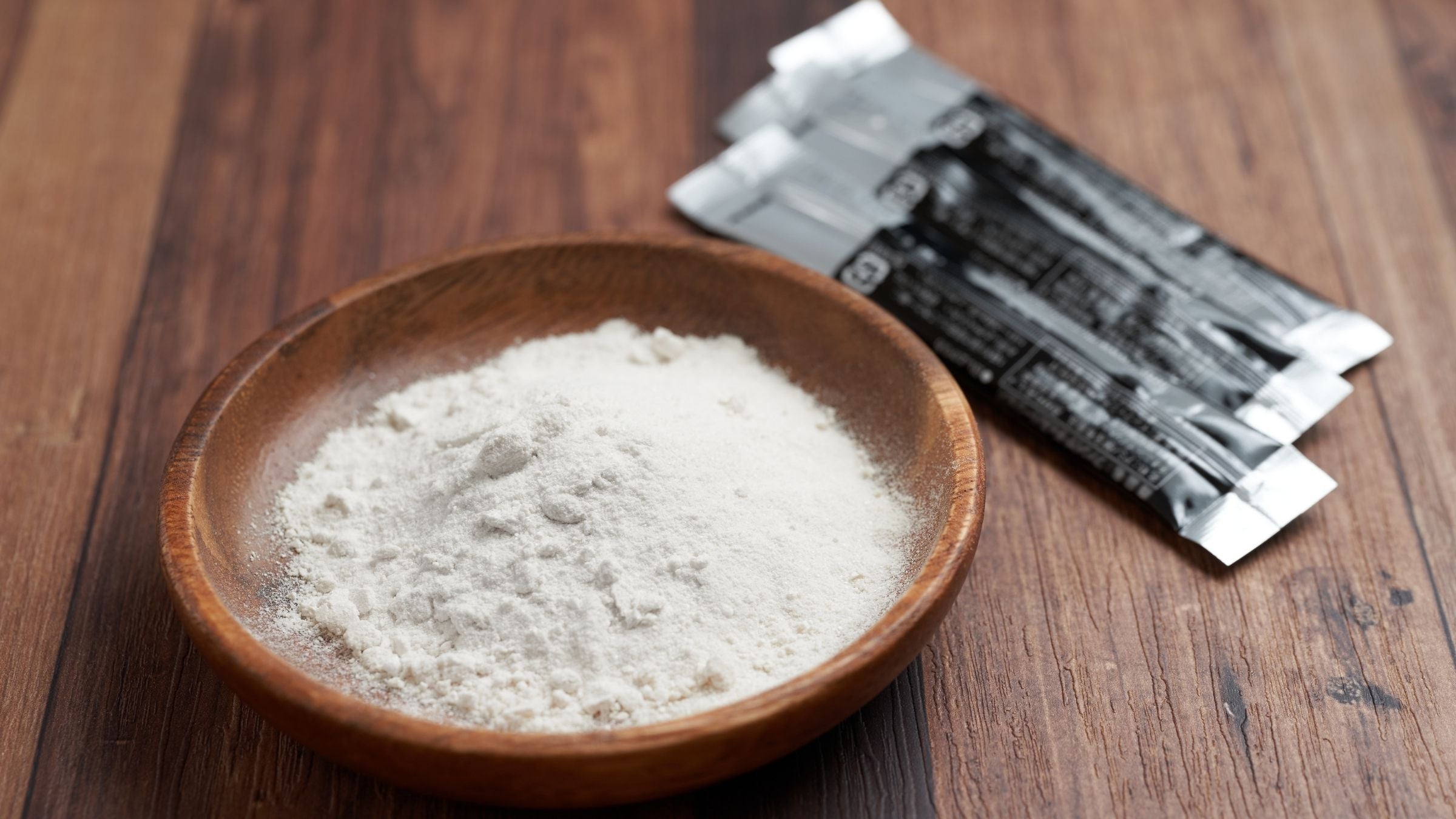
(Photo: Getty Images)
Table of Contents
By now, you’ve probably got the memo: athletes have been taking collagen supplements to deal with achy joints, boost performance, and fend off Father Time. In an era of superfood powders of all guises, it’s no surprise that collagen has now joined the party. Thanks to its buzz-worthy rise to fame, it’s never been easier to sip collagen-packed lattes and collagen-loaded smoothies.
But will using collagen supplements really make a difference in your health and performance? We did some digging on this potential fountain of youth.
What exactly is collagen, anyway?
Collagen is the most abundant type of protein in the body whose function is to help form structural scaffolding that supports organs and soft tissues. Think of it as the “glue” that holds everything together. It’s not just in your skin, but also your bones, muscles, hair, nails, cartilage, ligaments, and blood vessels. Like other proteins, it’s made up of amino acids – predominately glycine, proline, and lysine. Our bodies naturally make collagen from the amino acids and vitamins and minerals (such as vitamin C and copper) that we eat. But the body’s collagen production naturally decreases as we age, so that by the time we’ve hit our 30s, our bodies aren’t repairing themselves as fast as they once did. When collagen breaks down, the scaffolding is weakened and structures such as skin and ligaments are impacted. This is why skin gets get saggy and wrinkly – we’re losing collagen as we age.
There are three primary types of collagen in the body (and in supplements) —Types I, II, and III. Types I and III are most abundant in skin, connective tissue, bones, and blood vessels, while Type II is present in joint cartilage.
How do collagen supplements work?
In theory, as long as the body has sufficient amounts of the right raw materials, including certain amino acids, vitamins and minerals it should make sufficient amounts of collagen. But here’s what many collagen supplement manufacturers claim: As you age, your body breaks down more collagen and loses its ability to produce it as efficiently from these building blocks, so this drop in production can be blamed for cranky joints, thinning cartilage, and stalled muscle recovery. The reasoning goes that taking external collagen will help ameliorate this and, thereby, quell sore joints, make stiff body parts more fluid and mobile, improve bone health and leave you with skin that will defy your true age. (An anti-aging secret if there ever was one!)
Injectable and topical collagen products have been around for a while, but they target just one area of the body (for example, the tired-looking lines under your eyes). The new trend of collagen supplements suggest that ingesting it in powder form can aid in overall tissue health, plus make your runs a little less taxing on the joints. This could improve performance over time.
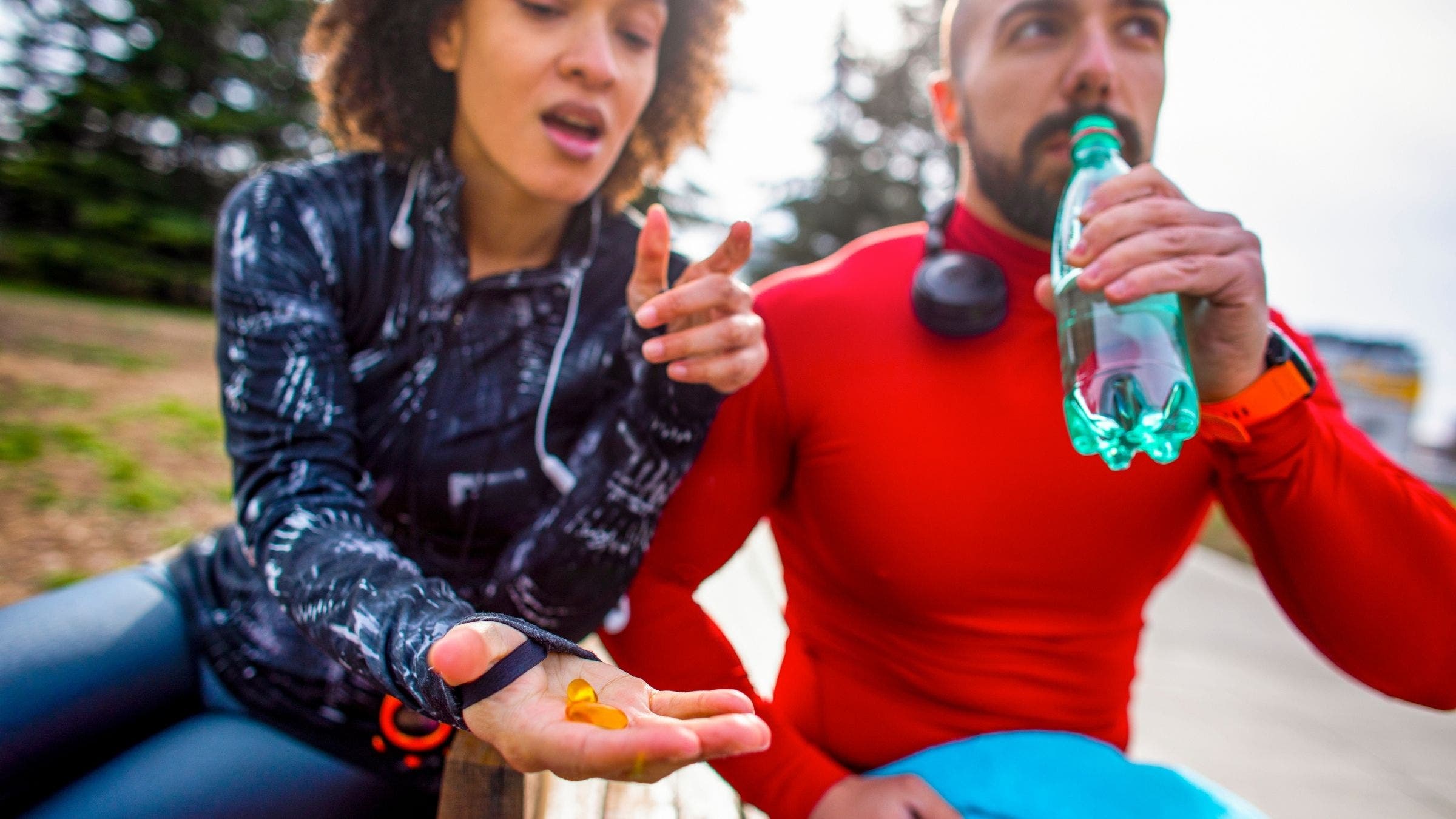
What does the science say about collagen for athletes?
You would think with all the hype surrounding collagen and the flood of supplements on the market that the science backing its body-benefiting powers is rock solid. But for the most part, the evidence is currently far from definitive. At this point, think of it as only suggestive, yet promising.
Collagen for training-related aches and pains
Research is limited when it comes to claims that collagen helps the body better handle the rigors of training and lessen the pain associated with working out and with conditions like arthritis. But there are some promising results out there. For starters, a 2021 randomized trial in the journal Nutrients involving 180 active men and women aged between 18 and 30 years with exercise-related knee pain but no diagnosed joint disease such as arthritis determined that the daily use of 5 grams of type 1 collagen peptides for 12 weeks resulted in a greater reduction in exercise-induced knee pain than a placebo. However, there was no reported benefit during resting conditions. One small-scale study from Penn State University found that 10 grams of collagen hydrolysate supplement taken for 24 weeks may have helped lessen activity-related joint pain among college athletes when they were walking, standing and lifting. Similarly, a report in the journal Applied Physiology, Nutrition, and Metabolism found that athletes who were suffering from knee joint pain experienced more relief after taking 5 grams of collagen peptides for 12 weeks than those taking a placebo. A systematic study review in the journal Amino Acids reported that collagen has shown to be beneficial in improving joint functionality and reducing joint pain in recreational athletes. In the same journal was a study suggesting collagen use can help alleviate some of the post-exercise muscle pain associated with damaging activities like jump training. And one randomized, double-blind investigation determined that 8 weeks of hydrolyzed chicken collagen type II usage in adults improved joint functioning by reducing pain and stiffness.
A meta-analysis of previous research says there is enough evidence to suggest that supplementing with collagen can help reduce pain symptoms in those with osteoarthritis, a condition where the cartilage within a joint begins to break down. But we should not be quick to associate arthritic joint pain with the pain you get after multiple days of running.
So if you are suffering from a nagging pain in your joints or prone to long bouts of post-training muscle discomfort using collagen may help give you some relief and let you bounce back quicker from those aggravating workouts. But we need to see more studies conducted on endurance athletes like runners and cyclists to know for sure if collagen supplementation decreases joint injury or increases recovery. For the most part, these aren’t long-term, large-scale studies we are working with.
What would be good to see are studies that better control for protein intake in participants so we can rule out that collagen had a positive impact for the simple reason it helped correct a shortfall in protein intake and, therefore, the amino acids needed to make collagen. Complicating matters further is that there are various types of collagen, so we don’t know if a supplement that provides more of one type would be better for a certain condition (like achy knees) than a supplement that is richer in another form.
RELATED: Got Sore Muscles? It Might Be Your Diet
Collagen and body composition
A few studies suggest that combining collagen peptide use with resistance training can help improve body composition (more muscle, less body fat) in older men and women. But likely no more so than when another protein source such as whey is paired with weight training. Animal studies and human studies conducted on postmenopausal women with age-related bone loss have linked supplementation with hydrolyzed collagen to increased bone mass, which could help with injury reduction. But more research needs to be done to see if healthy athletes would benefit in this way. Resistance training is likely much more important for maintaining and building bone strength than a daily collagen habit, but it might help boost the benefits of pumping iron.
The fact is collagen isn’t the best source of protein for muscle protein repair and synthesis because it doesn’t have an ideal amino acid profile to build muscle protein as does other animal-based sources such as whey or beef. This means that you should not count on it for this purpose. Collagen may only help preserve lean body mass if used as part of a diet that is overall low in protein. The benefit is just a function of improving a person’s protein intake. Some people will mix protein powders – say whey and collagen – to help form a more complete protein package.
Collagen and gut health
If you’re hoping collagen can help you with your GI issues, don’t get your hopes up. There aren’t any studies worth reporting about on collagen’s effects on gut health yet.
Though the overarching anti-aging marketing claims seem too good to be true, they may have some validity when it comes to skin appearance. There is a solid amount of evidence that consuming more collagen can improve skin health via its impact on skin connective tissue (dermis). Reducing the occurrence of wrinkles and improving skin elasticity are ways it appears to help turn back the clock on skin aging. Just keep in mind that you’ll need to take collagen consistently for several weeks to benefit and it’s likely as with most things with collagen older people will experience more improvement in skin health than younger individuals. A question mark is if applying collagen as a topical cream is more effective than taking collagen peptides through the mouth. And no amount of collagen use should negate the need to slather on sunscreen to keep your skin in good shape.
It’s worth noting that a handful of studies on collagen are coming from supplement companies themselves, so they are not beyond bias.
RELATED: 5 Common Gut-Provoking Mistakes Endurance Athletes Make
Do collagen supplements work as well as real food?
Ideally, you want to start with a food-first approach. That means getting enough protein in your diet, which for most athletes is at least 1.2 grams per kilogram of body weight, so you are taking in enough of the amino acids necessary to help lessen collagen breakdown and build more up. You’ll also want to consume adequate amounts of vitamin C from items like berries, citrus fruits, bell peppers and broccoli as we require this nutrient to help synthesize collagen. Your body also calls upon zinc and copper to support collagen production, so look to nuts, pumpkin seeds, and seafood for those micronutrients.
There are a few foods that contain formed collagen that could be helpful. These include bone broth (though research questions if many preparations can provide enough of the amino acids needed to create collagen), chicken skin, canned fish such as sardines and salmon that contain the skin and softened bones, tougher cuts of meat such as chuck and rump (it’s the collagen that makes these cuts perfect for slow cooking like braising), organ meats including liver and heart, and just for fun Jell-O which is made with gelatin, and gelatin is made from partially hydrolyzed collagen.
How to choose the best collagen supplement
If you’re bound and determine to try collagen supplements, there are a few things to keep in mind. Firs, the amount of collagen you will get when it’s delivered in gummies, coffee creamer, infused waters and energy bars is likely too little to make much impact, if any. To reap more of the potential rewards you are better off taking collagen as a concentrated powder similar to a protein powder like whey.
Opting for hydrolyzed collagen products is key because the amino acid chains are broken down to be more easily absorbed. (Just look for the words “peptides” or “hydrolyzed” on the packaging.) The research suggests that hydrolyzed collagen which forms chains of amino acids (peptides) can be absorbed intact through the digestive tract and make it into the bloodstream. Here they may have a better chance of getting to their target tissues like the skin and then helping form collagen than the individual amino acids that are formed when whole collagen is broken down by digestive enzymes. But this does not necessarily guarantee the peptides are used for this purpose. It’s difficult to show that the collagen we eat automatically gets turned into collagen that our tissues use.Your body may distribute the peptides and amino acids that makeup collagen elsewhere, say to your brain or heart.It’s hard to say if you can “spot-train” the supplement to get distributed where you want.
Many brands contain bovine collagen peptides (which is made from the connective tissue, bones and hides of cows) because it contains types I and III collagen, which may best match the overall needs of most people. Plus, hydrolyzed collagen powders are more versatile since they dissolve easier in hot and cold foods, like soups or smoothies. Or, of course, your morning cup of coffee.
You can also look for a supplement labeled with an NSF or Certified for Sport label, which offers an additional level of testing to make sure you are getting what you are paying for and nothing you don’t want such as banned substances not declared on the label.
If you’re full-blown plant-based, you can’t really partake—actual collagen can only be sourced from animals, though some companies are trying to replicate it using genetically modified yeast and bacteria. Largely, most companies sell “collagen boosters” as vegan supplements which contain amino acids, silica and various vitamins and minerals, such as vitamin C and zinc that the body needs to make collagen. The value of these is questionable.
A tricky part is knowing how much to take. About 10 grams a day seems to be a safe bet, with more potential benefits if you take this consistently. Safety-wise, there is not any research suggesting using collagen in reasonable amounts poses a health risk. Perhaps the biggest hit will be to your wallet. It’s not the cheapest supplement on the market.
RELATED: When To Take Your Vitamins and Supplements
The bottom line on collagen
Undeniably, natural collagen is good for joint, skin, and bone health, but the science, which is still in its infancy, hasn’t definitively shown the benefits extend to collagen supplements. More studies on humans—and athletes in particular—need to be conducted to make decisive conclusions and recommendations. Though some of the research behind their benefits is undeniably favorable. So if you are an active person with frequent joint and muscle pain or are dealing with a tendon or ligament injury and want a little bit of extra support, collagen supplementation could be considered.
Ultimately, tweaking your training program and maybe eating more total protein might be more effective at soothing your achy joints than downing collagen shakes. Remember, your 45-year-old body is not as resilient as your 20-year-old self. And always keep in mind that our collagen levels drop by about 1 percent per year after we hit our 40s, so it’s not like you’re severely deficient in it by the time you’ve hit middle age. You’ll be let down if you expect collagen supplements to be the magical solution to all your body woes.
The best collagen supplements for triathletes
These days, there’s no shortage of collagen powders to pick from. Here are some of the better options among the crowded field.
Gnarly Collagen Pro Unflavored
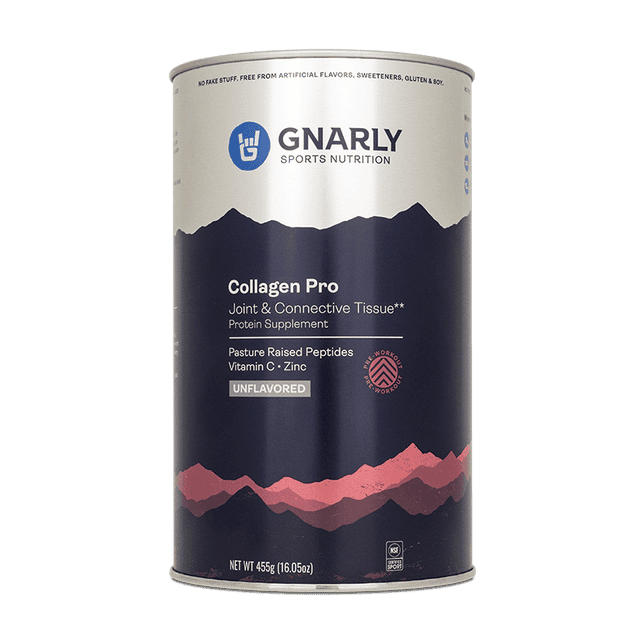
Hydrolyzed bovine collagen that also comes with vitamin C and zinc, two nutrients needed for collagen formation. Great when you want other flavors of your smoothie to shine through.
Great Lakes Wellness Collagen Hydrolysate Chai
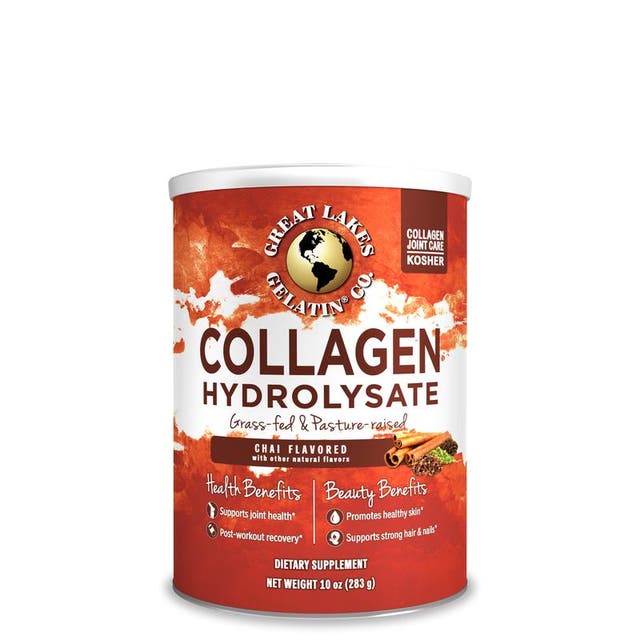
A flavor that is perfect for hot beverages, this powder dissolves easily without the worry of clumping.
Zhou Collagen Peptides
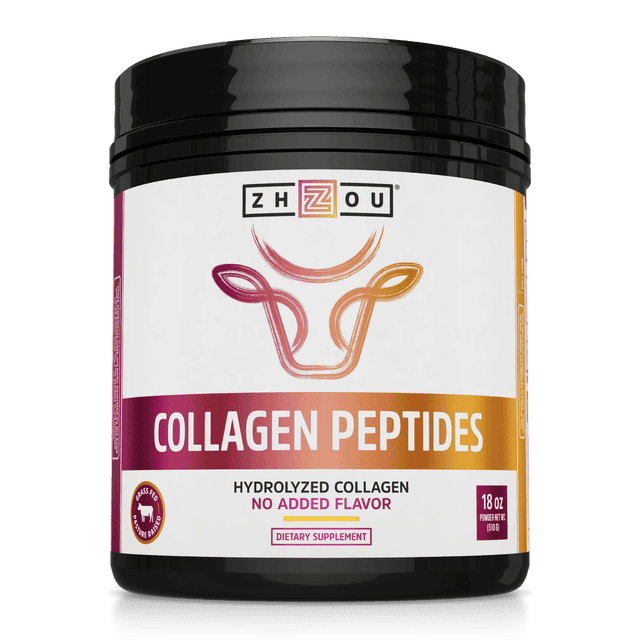
Sourced from pasture-raised cows with each scoop supplying ample amounts of type 1 and III collagen. Good for people who don’t like flavorings or sweeteners in their powders.
Live Conscious Beyond Collagen
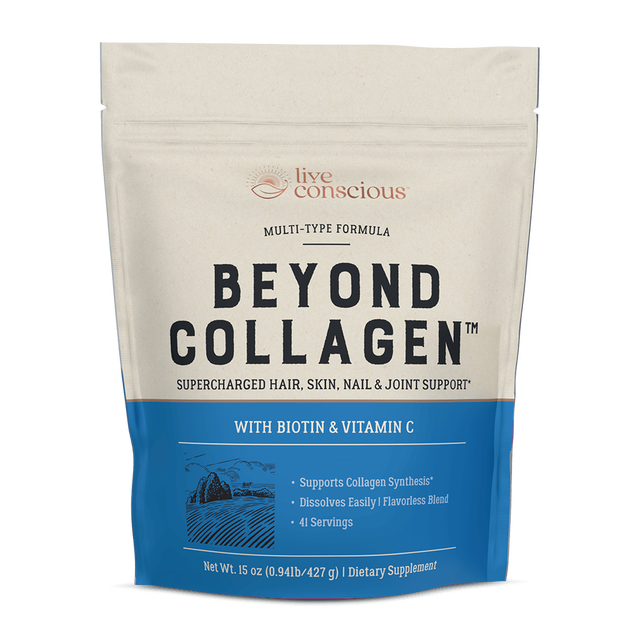
Each bag contains plenty of servings of a blend of bovine, chicken, marine and eggshell collagen. Also comes with added vitamin C.
Super Rowdy Snickerdoodle Cookie
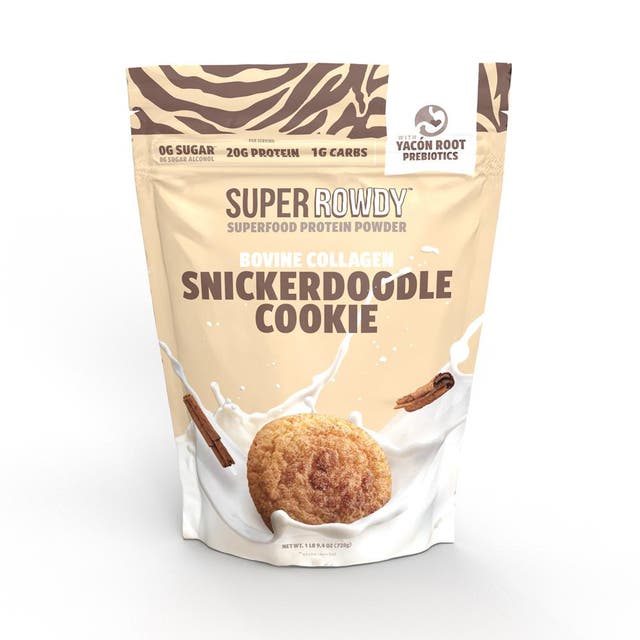
Perhaps the most fun flavor out there, this powder can transform your post-training shake or morning bowl of oatmeal into something that tastes more like a desert. Yacon root powder provides some prebiotics to support gut health.